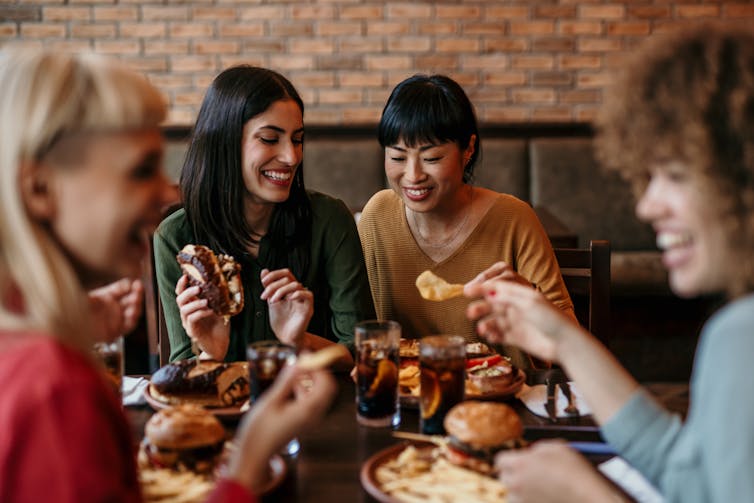Have you ever noticed changes in your eating habits when you are sad, bored or anxious?
Many people report eating either more, or less, as a way of helping them to cope when they experience difficult emotions.
Although this is a very normal response, it can take the pleasure out of eating, and can become distressing and bring about other feelings of shame and self-criticism.
Adding to the complexity of it all, we live in a world where diet culture is unavoidable, and our relationship to eating, food and body image can become complicated and confusing.
Emotional eating is common
“Emotional eating” refers to the eating behaviours (typically eating more) that occur in response to difficult emotions.
Research shows around 20% of people regularly engage in emotional eating, with a higher prevalence among adolescents and women. In a study of more than 1,500 adolescents, 34% engaged in emotional eating while sad and 40% did so while anxious.
Foods consumed are often fast-foods and other energy-dense, nutrient-poor convenience foods.
Stress, strong emotions and depression
For some people, emotional eating was simply a habit formed earlier in life that has persisted over time.
But other factors might also contribute to the likelihood of emotional eating. The physiological effects of stress and strong emotions, for example, can influence hormones such as cortisol, insulin and glucosewhich can also increase appetite.
Increased impulsivity (behaving before thinking things through), vulnerability to depression, a tendency to ruminate and difficulties regulating emotions also increase the likelihood of emotional eating.
TommyStockProject/Shutterstock
So what do you do?
First, know that fluctuations in eating are normal. However, if you find that the way you eat in response to difficult emotions is not working for you, there are a few things you can do.
Starting with small things that are achievable but can have a huge impact, such as prioritising getting enough sleep and eating regularly.
Then, you can start to think about how you handle your emotions and hunger cues.
Expand your emotional awareness
Often we label emotions as good or bad, and this can result in fear, avoidance, and unhelpful coping strategies such as emotional eating.
But it’s also important to differentiate the exact emotion. This might be feeling isolated, powerless or victimised, rather than something as broad as sad.
By noticing what the emotion is, we can bring curiosity to what it means, how we feel in our minds and bodies, and how we think and behave in response.
Tap into your feelings of hunger and fullness
Developing an intuitive way of eating is another helpful strategy to promote healthy eating behaviours.
Intuitive eating means recognising, understanding and responding to internal signals of hunger and fullness. This might mean tuning in to and acknowledging physical hunger cues, responding by eating food that is nourishing and enjoyable, and identifying sensations of fullness.
Intuitive eating encourages flexibility and thinking about the pleasure we get from food and eating. This style of eating also allows us to enjoy eating out with friends, and sample local delicacies when travelling.
It can also reduce the psychological distress from feeling out of control with your eating habits and the associated negative body image.

The Family/Shutterstock
When is it time to seek help?
For some people, the thoughts and behaviours relating to food, eating and body image can negatively impact their life.
Having the support of friends and family, accessing online resources and, in some instances, seeing a trained professional, can be very helpful.
There are many therapeutic interventions that work to improve aspects associated with emotional eating. These will depend on your situation, needs, stage of life and other factors, such as whether you are neurodivergent.
The best approach is to engage with someone who can bring compassion and understanding to your personal situation, and work with you collaboratively. This work might include:
- unpacking some of the patterns that could be underlying these emotions, thoughts and behaviours
- helping you to discover your emotions
- supporting you to process other experiences, such as trauma exposure
- developing a more flexible and intuitive way of eating.
One of the dangers that can occur in response to emotional eating is the temptation to diet, which can lead to disordered eating, and eating disorder behaviours. Indicators of a potential eating disorder can include:
- recent rapid weight loss
- preoccupation with weight and shape (which is usually in contrast to other people’s perceptions)
- eating large amounts of food within a short space of time (two hours or less) and feeling a sense of loss of control
- eating in secret
- compensating for food eaten (with vomiting, exercise or laxatives).
Evidence-based approaches can support people experiencing eating disorders. To find a health professional who is informed and specialises in this area, search the Butterfly Foundation’s expert database.





